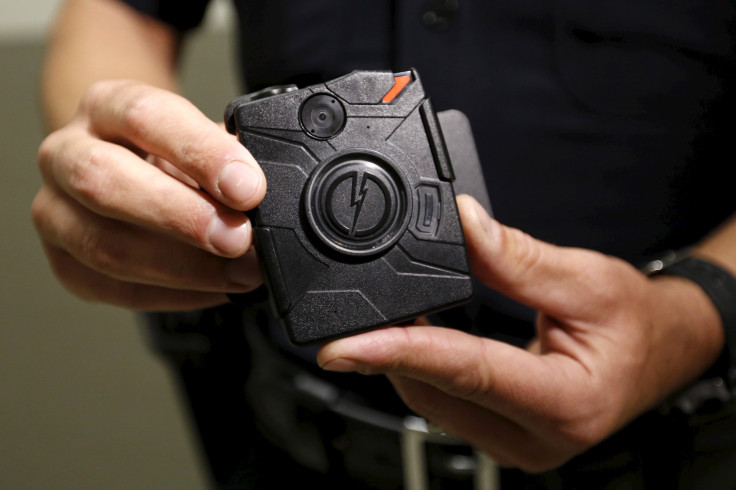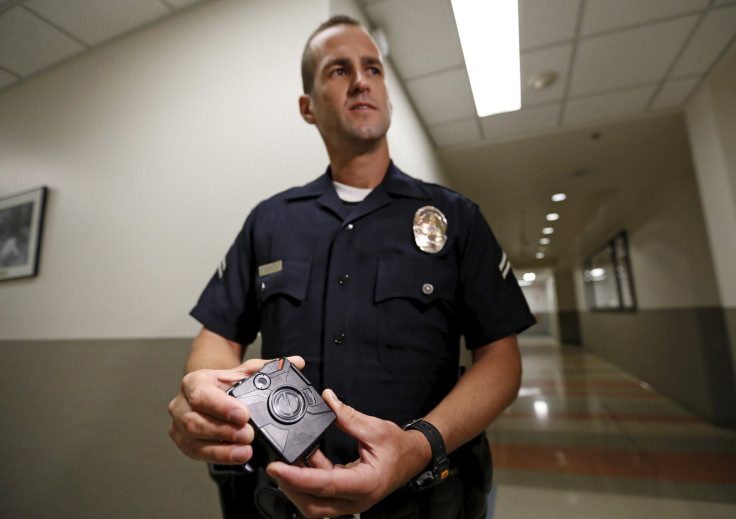The LAPD Plans To Buy 7,000 Police Body Cameras, But Administrators Balk Over Price And Critics Cry Foul

LOS ANGELES — If all goes according to plan, the Los Angeles Police Department will strike a five-year, $57 million contract with Taser International to outfit 7,000 uniformed officers with body-worn cameras by the end of 2016, representing the largest purchase of police body cameras in America to date. The contract has been approved by Los Angeles Sheriff Charlie Beck, but a City Council vote will be needed to seal the deal and appropriate the necessary city funds.
“It’s a game-changer,” Mitchell Englander, a Los Angeles City Council member who chairs the city’s Public Safety Commission, told International Business Times. “In terms of technology, it’s one of the most useful and important tools for the department to deploy — as important as bulletproof vests.”
If the contract is approved, the LAPD will have more uniformed officers wearing body cameras than do the forces of Chicago, New York, Philadelphia and Houston combined. The City Council was slated to decide on the body camera deal in December, but “sticker shock” over the price of the contract — and scrutiny over how it came about — has delayed the vote.
Typically, whenever a city like Los Angeles wants a new service or product, it will put out a request for a proposal to many firms in the hopes of finding the cheapest and best product or service. This was not the case with the body camera contract.
According to a memo from the Los Angeles city administrative officer, the LAPD was given authority to “piggyback” its larger contract with Taser on a smaller contract with Kern County, California. “The city attorney has determined that the LAPD may ‘piggyback’ on the Kern County process in lieu of conducting its own procurement” for a body camera vendor, the memo reads.
On the heels of that decision, smaller police body camera companies have cried foul, saying their companies should have been invited to bid. “We could have given it to [the LAPD] for way less,” said Lorena Golveo, the sales director for Wolfcom, which manufactures body cameras in Los Angeles. “It’s an insane amount of money. Our camera is a better camera.”
Some have also suggested political dontations could have influenced the LAPD's deal with Taser. As the Los Angeles Times reported in December 2015, executives within Taser International gave $8,400 to councilman Mitchell Englander, the elected official who has championed body cameras. No other body camera companies have given contributions to LA City Council members.
The Los Angeles Times editorial board later criticized Englander and Taser, saying while the donations were technically legal because the LAPD was not “in the midst of a formal bid process," the money given was not within the “spirit of the law.”
Englander rebuffed the claims in an interview, saying the donations were made long before Taser began bidding on the contract, and thus not subject to local donation laws. “Let me be crystal clear,” he said. “There weren’t any [requests for proposals] out there. I had no role or discussion with picking any technology or looking at any vendor. It was all driven by the [Los Angeles Police] Department.”
No LA officials (or members of the 15-person City Council) have called for Englander to abstain from the vote, but some have voiced concern about the cost of the deal. Councilman Joe Buscaino, a former police officer, said recently the funds might be better used for additional city officers. "It's hard for me to go back to my community, who's demanding … more cops on the street," he said recently. However, he also said he was likely to support the deal "reluctantly."
The contract is garnering support from influential Los Angeles officials. It has been publicly championed by both Mayor Eric Garcetti and police Chief Charlie Beck. The Los Angeles Police Commission recently backed the deal as well. A spokesperson for council President Herb Wesson declined to comment on which way the councilman would vote. The spokesperson, however, confirmed the new vote could come as soon as the end of January or early February.

Police-worn body cameras, which are attached to an officer’s shirt and record interactions with civilians, have become an emerging trend among law enforcement trend in the wake of several violent, often fatal, police-involved incidents. After protests erupted over the shooting of Laquan McDonald, for instance, Chicago Mayor Rahm Emmanuel announced more police officers would be outfitted with cameras. Some studies even suggest that in communities where police officers already wear cameras, use-of-force complaints — as well as legal costs associated with police brutality cases — have plummeted.
The cameras are becoming a national movement. In December 2014, just four months after the shooting death of Michael Brown in Ferguson, Missouri, President Obama unveiled a $75 million package to help local law enforcement purchase cameras in a national effort to revitalize “community policing” tactics and restore trust in America’s uniformed officers.
Each body camera unit from Taser will cost about $1,000, an official city memo said, but the monthly costs to maintain the video storage — as well as a requested 122-person staff to maintain the videos — drive up the prices for the city.
While some cities have taken up Obama's offer with limited pilot programs, none has been as aggressive as the LAPD. Currently, the city, which has about 9,000 sworn officers, contracts with Taser for the use of 890 body cameras. Should the contract get voted through, the LAPD would buy an additional 6,140 cameras, bringing the total to 7,000.
While body cameras may seem like a common-sense transparency tool, their ultimate effectiveness has yet to be proved on any sort of major scale. One thing is certain, though: They are a lucrative new endeavor for the technology firms that provide the product.
Taser International, the Arizona firm that hopes to secure the deal with the LAPD, has become the leader in the body camera industry, which now has about 40 competing firms. The company, which is more traditionally known for its stun guns, earned $57 million in revenue in 2014 from its body camera business, representing 294 percent annual growth from 2013. In financial filings, the company describes the body camera business as a “paradigm shift that will ultimately overtake the ... in-car camera market.”
Steve Tuttle, a communications manager with Taser, declined to comment on the LAPD’s potential upcoming purchase. “As a publicly traded company, I can’t comment on possible future LAPD orders as we can only comment on orders after we receive the actual [purchase orders],” Tuttle said in an email to IBT.
If the deal goes through, however, it will be three times the size of the company’s next-largest contract in San Antonio, which purchased 2,200 body cameras in November.
Taser touts its high tech, but there's another reason the company has found success: political donations and lobbying. In 2014, the company spent more than $3.4 million lobbying local officials around the United States, recent financial filings show.
Perhaps the most vocal critics of the LAPD Taser deal have been other body camera companies, who don't have the deep lobbying pockets Taser does.
“We could do 6,140 body-worn cameras for about half the amount the LAPD is planning to spend,” Robert McKeeman, the chief executive of Georgia-based Utility, told the LA Times recently.
In an editorial published earlier this month, the LA Times praised City Council members for delaying the vote to add scrutiny to the deal.
“Because the city did not go through the usual competitive bidding process and decided instead to ‘piggyback’ on Kern County's bidding process for just 30 cameras, the council can't be sure that the city is getting a good deal,” the LA Times wrote.
Galveo, the sales director of Wolfcom, would agree. She said the LAPD should have given her company a shot at the bid, especially because Wolfcom is a local firm. “They’re in our backyard,” she said. “We’re in Hollywood.”
“This body cameras business has become ugly. It’s all about the money now,” she added.
Officials within the LAPD did not return multiple requests for comment.
© Copyright IBTimes 2024. All rights reserved.





















